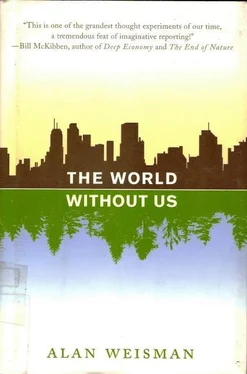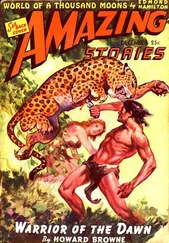
Five-hundred-year-old oaks. Białowieża Puszcza, Poland.
PHOTO BY JANUSZ KORBEL.
Andrzej Bobiec recognized it instantly. As a forestry student in Krakow, he’d been trained to manage forests for maximum productivity, which included removing “excess” organic litter lest it harbor pests like bark beetles. Then, on a visit here he was stunned to discover 10 times more biodiversity than in any forest he’d ever seen.
It was the only place left with all nine European woodpecker species, because, he realized, some of them only nest in hollow, dying trees. “They can’t survive in managed forests,” he argued to his forestry professors. “The Białowieża Puszcza has managed itself perfectly well for millennia.”
The husky, bearded young Polish forester became instead a forest ecologist. He was hired by the Polish national park service. Eventually, he was fired for protesting management plans that chipped ever closer to the pristine core of the Puszcza. In various international journals, he blistered official policies that asserted that “forests will die without our thoughtful help,” or that justified cutting timber in the Białowieża’s surrounding buffer to “reestablish the primeval character of stands.” Such convoluted thinking, he accused, was rampant among Europeans who have hardly any memory of forested wilderness.
To keep his own memory connected, for years he daily laced his leather boots and hiked through his beloved Puszcza. Yet although he ferociously defends those parts of this forest still undisturbed by man, Andrzej Bobiec can’t help being seduced by his own human nature.
Alone in the woods, Bobiec enters into communion with fellow Homo sapiens through the ages. A wilderness this pure is a blank slate to record human passage: a record he has learned to read. Charcoal layers in the soil show him where gamesmen once used fire to clear parts of the forest for browse. Stands of birch and trembling aspen attest to a time when Jagiełło’s descendants were distracted from hunting, perhaps by war, long enough for these sun-seeking species to recolonize game clearings. In their shade grow telltale seedlings of the hardwoods that were here before them. Gradually, these will crowd out the birch and aspen, until it will be as if they were never gone.
Whenever Bobiec happens on an anomalous shrub like hawthorn or on an old apple tree, he knows he’s in the presence of the ghost of a log house long ago devoured by the same microbes that can turn the giant trees here back into soil. Any lone, massive oak he finds growing from a low, clover-covered mound marks a crematorium. Its roots have drawn nourishment from the ashes of Slavic ancestors of today’s Belorusians, who came from the east 900 years ago. On the northwest edge of the forest, Jews from five surrounding shtetls buried their dead. Their sandstone and granite headstones from the 1850s, mossy and tumbled by roots, have already worn so smooth that they’ve begun to resemble the pebbles left by their mourning relatives, who themselves long ago departed.
Andrzej Bobiec passes through a blue-green glade of Scots pine, barely a mile from the Belarusian border. The waning October afternoon is so hushed, he can hear snowflakes alight. Suddenly, there’s a crashing in the underbrush, and a dozen wisent— Bison bonasus, European bison—burst from where they’ve been browsing on young shoots. Steaming and pawing, their huge black eyes glance just long enough for them to do what their own ancestors discovered they must upon encountering one of these deceptively frail bipeds: they flee.
Just 600 wisent remain in the wild, nearly all of them here—or just half, depending on what’s meant by here. An iron curtain bisects this paradise, erected by the Soviets in 1980 along the border to thwart escapees to Poland’s renegade Solidarity movement. Although wolves dig under it, and roe deer and elk are believed to leap it, the herd of these largest of Europe’s mammals remains divided, and with it, its gene pool—divided and mortally diminished, some zoologists fear. Once, following World War I, bison from zoos were brought here to replenish a species nearly extirpated by hungry soldiers. Now, a remnant of a Cold War threatens them again.
Belarus, which well after communism’s collapse has yet to remove statues of Lenin, also shows no inclination to dismantle the fence, especially as Poland’s border is now the European Union’s. Although just 14 kilometers separate the two countries’ park headquarters, to see the Belovezhskaya Pushcha, as it is called in Belorusian, a foreign visitor must drive 100 miles south, take a train across the border to the city of Brest, submit to pointless interrogation, and hire a car to drive back north. Andrzej Bobiec’s Belorusian counterpart and fellow activist, Heorhi Kazulka, is a pale, sallow invertebrate biologist and former deputy director of Belarus’s side of the primeval forest. He was also fired by his own country’s park service, for challenging one of the latest park additions—a sawmill. He cannot risk being seen with Westerners. Inside the Brezhnev-era tenement where he lives at the forest’s edge, he apologetically offers visitors tea and discusses his dream of an international peace park where bison and moose would roam and breed freely.
The Pushcha’s colossal trees are the same as those in Poland; the same buttercups, lichens, and enormous red oak leaves; the same circling white-tailed eagles, heedless of the razor-wire barrier below. In fact, on both sides, the forest is actually growing, as peasant populations leave shrinking villages for cities. In this moist climate, birch and aspen quickly invade their fallow potato fields; within just two decades, farmland gives way to woodland. Under the canopy of the pioneering trees, oak, maple, linden, elm, and spruce regenerate. Given 500 years without people, a true forest could return.
The thought of rural Europe reverting one day to original forest is heartening. But unless the last humans remember to first remove Belarus’s iron curtain, its bison may wither away with them.
CHAPTER 2

Unbuilding Our Home
“‘If you want to destroy a barn,’ a farmer once told me, ‘cut an eighteen-inch-square hole in the roof. Then stand back.’”
—architect Chris Riddle
Amherst, Massachusetts
ON THE DAY after humans disappear, nature takes over and immediately begins cleaning house—or houses, that is. Cleans them right off the face of the Earth. They all go.
If you’re a homeowner, you already knew it was only a matter of time for yours, but you’ve resisted admitting it, even as erosion callously attacked, starting with your savings. Back when they told you what your house would cost, nobody mentioned what you’d also be paying so that nature wouldn’t repossess it long before the bank.
Even if you live in a denatured, postmodern subdivision where heavy machines mashed the landscape into submission, replacing unruly native flora with obedient sod and uniform saplings, and paving wetlands in the righteous name of mosquito control—even then, you know that nature wasn’t fazed. No matter how hermetically you’ve sealed your temperature-tuned interior from the weather, invisible spores penetrate anyway, exploding in sudden outbursts of mold—awful when you see it, worse when you don’t, because it’s hidden behind a painted wall, munching paper sandwiches of gypsum board, rotting studs and floor joists. Or you’ve been colonized by termites, carpenter ants, roaches, hornets, even small mammals.
Читать дальше













